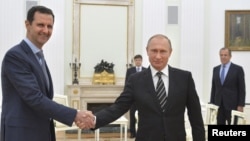The Russian Foreign Ministry says the fate of embattled Syrian President Bashar al-Assad should be decided by the Syrian people, and that keeping him in power is not crucial to Moscow's objectives.
"We have never said Assad's staying in power is a principled aspect" of Russian policy on Syria, Foreign Ministry spokeswoman Maria Zakharova told Ekho Moskvy radio Tuesday. Instead, she stressed that the preservation of a functioning government in the Syrian state is central to ending more than four years of civil war.
She also warned that regime change in Syria, currently sought by a host of Western nations, could become a "regional catastrophe," making worse the effects of a war that has claimed the lives of more than 200,000 people and created millions of refugees since 2011.
Later Tuesday at the White House, spokesman Josh Earnest discounted the Russian comments, saying "I have doubts that [they] reflect any sort of change" in what he described as Moscow's "flawed strategy" in Syria.
'Fundamental differences'
The comments from the two capitals highlight fundamental differences in U.S. and Russian strategy toward Syria, with Washington and its allies insisting that Assad cannot be part of any long-term political solution for the country.
Russia, however, has stepped up its military support for the embattled president in the past two months, deploying warplanes to the country and carrying out airstrikes.
Russian diplomats and military officials contend the air attacks are aimed at Islamic State extremists, but that claim is widely disputed by the U.S. and others, who say the Russians too often have bombed Syrian opposition fighters who have no connection with, or allegiance to, the Islamic State militants.
U.S. analysts say the Russian airstrikes are mainly targeting moderate rebels battling pro-regime forces, and only occasionally hit Islamic State targets.
Myriad airstrikes
Russia denies its airstrikes in Syria have been carried out in such an indiscriminate manner.
A U.S.-led coalition also is carrying out airstrikes against Islamic State extremist targets in Syria, and last week Obama announced the deployment of about 50 U.S. special-forces troops to support and advise local fighters battling IS fighters. The White House says American troops in Syria will not directly engage in raids or combat.
The efficacy of that coalition, known as the Syrian Democratic Forces, remains far from clear. Last month, the Pentagon scrapped a program aimed at training and arming Syrian rebels, after reports surfaced that the force was too small and ineffective to confront IS fighters.





